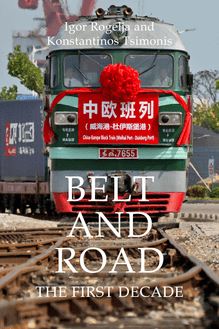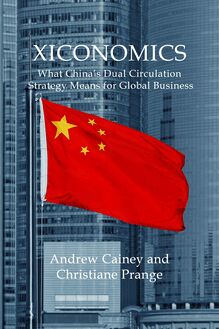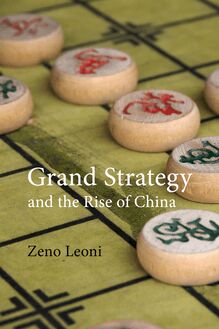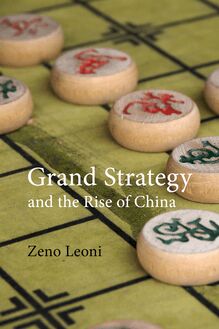-
 Univers
Univers
-
 Ebooks
Ebooks
-
 Livres audio
Livres audio
-
 Presse
Presse
-
 Podcasts
Podcasts
-
 BD
BD
-
 Documents
Documents
-
- Cours
- Révisions
- Ressources pédagogiques
- Sciences de l’éducation
- Manuels scolaires
- Langues
- Travaux de classe
- Annales de BEP
- Etudes supérieures
- Maternelle et primaire
- Fiches de lecture
- Orientation scolaire
- Méthodologie
- Corrigés de devoir
- Annales d’examens et concours
- Annales du bac
- Annales du brevet
- Rapports de stage
La lecture à portée de main
Vous pourrez modifier la taille du texte de cet ouvrage
Découvre YouScribe en t'inscrivant gratuitement
Je m'inscrisDécouvre YouScribe en t'inscrivant gratuitement
Je m'inscrisEn savoir plus
Vous pourrez modifier la taille du texte de cet ouvrage
En savoir plus

Description
Matters of ideology and security have become deeply entwined in China’s economic and business environment. The context is more politicized, more uncertain. At the heart of Xiconomics is the Dual Circulation Strategy, which marks out clear dividing lines between China’s domestic economy and the rest of the world. It sets out how China seeks to manage the links between the two just when western countries are also focusing on decoupling and "friendshoring". In order to prosper, business leaders and policy-makers need to understand these new international dynamics.
In this concise and incisive analysis, Andrew Cainey and Christiane Prange explain what is happening in China and how this affects its relations with other countries. They identify what foreign companies need to do, how strategies need to change, and what this all means for managing the China business as part of a global portfolio, under a range of geopolitical scenarios.
Introduction
Part I Dual circulation strategy and Xiconomics
1. What is dual circulation strategy?
2. Dual circulation: more continuity than change
3. Xiconomics and the China Policy puzzle
4. Putting the Xi into Xiconomics
Part II Three questions for global business
5. How will China’s internal business environment develop?
6. What role will China play in the world of external circulation?
7. Internal and external: separate or connected?
Part III Implications for global business
8. Multinationals and China
9. How dual circulation changes the game
10. Ambidexterity and connectivity
11 Resilience and agility in the face of uncertainty
12. Conclusion: navigating the contradictions in China’s ambitions
Sujets
Informations
| Publié par | Agenda Publishing |
| Date de parution | 27 avril 2023 |
| Nombre de lectures | 0 |
| EAN13 | 9781788216302 |
| Langue | English |
Informations légales : prix de location à la page 0,1750€. Cette information est donnée uniquement à titre indicatif conformément à la législation en vigueur.
Extrait
Xiconomics
Business with China
Series Editor: Kerry Brown
The titles in this series explore the complex relationship between Chinese society and China’s global economic role. Exploring a wide range of issues the series challenges the view of a country enclosed in on itself, and shows how the decisions made by Chinese consumers, the economic and political choices made by its government, and the fiscal policies followed by its bankers are impacting on the rest of the world.
Published
Belt and Road: The First Decade
Igor Rogelja and Konstantinos Tsimonis
China’s Hong Kong: The Politics of a Global City
Tim Summers
The Future of UK–China Relations: The Search for a New Model
Kerry Brown
Xiconomics: What China’s Dual Circulation Strategy Means for Global Business
Andrew Cainey and Christiane Prange
Xiconomics
What China’s Dual Circulation Strategy Means for Global Business
Andrew Cainey and Christiane Prange
© Andrew Cainey and Christiane Prange 2023
This book is copyright under the Berne Convention.
No reproduction without permission.
All rights reserved.
First published in 2023 by Agenda Publishing
Agenda Publishing Limited
The Core
Bath Lane
Newcastle Helix
Newcastle upon Tyne
NE4 5TF
www.agendapub.com
ISBN 978-1-78821-627-2 (hardcover)
ISBN 978-1-78821-628-9 (paperback)
British Library Cataloguing-in-Publication Data
A catalogue record for this book is available from the British Library
Typeset by Newgen Publishing UK
Printed and bound in the UK by 4edge
Contents
Preface
Introduction
Part I Dual Circulation Strategy and Xiconomics
1. What is Dual Circulation Strategy?
2. Dual Circulation: more continuity than change
3. Xiconomics and the China policy puzzle
4. Putting the “Xi” into Xiconomics
Part II Three questions for global business
5. How will China’s internal business environment develop?
6. What role will China play in the world of external circulation?
7. How will the internal and the external connect?
Part III Implications for global business
8. Multinationals and China
9. How Dual Circulation changes the game
10. Ambidexterity and connectivity
11. Resilience and agility in the face of uncertainty
Conclusion: navigating the contradictions in China’s ambitions
Notes
Index
Preface
Doing business in and with China – never easy – has become much more complicated, volatile and controversial. In 2017 Xi Jinping declared that China had entered a “new era”, in which “Xi Jinping Thought on Socialist Economy with Chinese Characteristics” would be the sole guiding principle for financial and economic decision-making. “Xiconomics”, for short. In 2020 Xi Jinping announced Dual Circulation Strategy as China’s new development pattern, with the priority on China’s domestic economy. Business too had entered a new era.
Until recently multinational companies had enjoyed rapid growth and profits in many sectors of the Chinese economy. They did this by adapting to the local context, providing products that Chinese consumers value and demonstrating to the government how their operations supported China’s development. This was all part of China’s increasing integration in the world economy. What mattered much less was the ideology of the Communist Party of China (CPC), questions of national security and, indeed, in which country a multinational was headquartered. To the extent that shareholders and governments back at home had a view, they supported expansion in China.
Much has now changed in this world. The China context too has transformed. China remains the world’s largest market in sector after sector and is the world leader in renewables, electric vehicles and digitization. But the business environment is more uncertain – and, especially for those who have faced Covid-19 travel bans – more opaque. Business leaders now need to know how Party ideology and national security fit into China’s economic ambitions. Xi Jinping’s leadership pervades all questions of policy and business climate. Geopolitical tensions increase the complexity. Governments, investors, customers and employees outside China no longer automatically support investment in China. Doing more business in China can cause problems back at home, but many multinationals earn sizeable revenues and profit in China. They see further growth potential, while developing alternatives to China takes time and effort even where it is an option.
Uncertainties abound. At the time of writing it is hard to disentangle the economic impact of Covid-19 lockdowns from more deep-seated problems in the real estate sector and elsewhere. At the 20th Party Congress, held in October 2022, Xi Jinping was officially confirmed in his third term as leader. This demonstration of Xi’s political dominance was followed a month later by widespread protests against his zero-Covid-19 policy and a rapid policy about-turn. What happens next is uncertain. There is now a reopening of international travel and apparent renewed focus on the economy. But many still expect a tightening of Party control over society and economy, with security remaining the priority and no clear plan to address economic challenges. For the reader, these uncertainties may have mostly resolved themselves. But we can be sure that new ones will come in their place. Against this backdrop, the purpose of this book is to provide a better understanding of the opportunities and challenges for global business in and with China today and then indicate how best to navigate the inherent uncertainty and contradictions.
We wrote this book for several reasons. First, we wanted to break down the barriers between writings on the CPC, national security, ideology and macroeconomic policy, on the one hand, and business strategy and organization, on the other. Historically, many of the former topics have been judged “too political” and so not a matter for business. Such a split is increasingly unsustainable. In today’s world, and especially today’s China, business leaders need an integrated view. But most cannot easily take time away from the day-to-day of business to understand what matters and what does not. This book summarizes the key points that business leaders need to know, while providing guidance on useful sources for those who want to read further. It draws on our own experience of 25 years living and working in China in both business and academia, investigating and analysing these issues.
Second, Xi Jinping’s announcement of Dual Circulation Strategy struck us as timely and of great relevance for today’s world of decoupling and disengagement. After decades of increasingly seamless integration across borders, Dual Circulation lays down a clear dividing line between “internal circulation” (the Chinese economy) and “external circulation” (the rest of the world). And it sees the link between the two as something to be managed – for China’s advantage. The resurgence of the CPC in leading all aspects of Chinese society reinforces how different the “internal” is and will be from the “external”. In contrast to his predecessors, Xi has taken the lead role in economic policy too. Xiconomics goes with Dual Circulation. This book traces a path from academic writings on Dual Circulation and the speeches of Xi Jinping through to the key choices and challenges facing China before examining what this all means for business, both in China and globally.
Finally, the 20th Party Congress has confirmed that security and ideology will play a critical role in China’s future economic development – and, therefore, in its business environment. Xi Jinping spoke of the people’s security as the “ultimate goal”. He placed greater prominence on national security, Marxist-Leninist ideology and Party-building activities, alongside mentions of economic growth and continued opening up to the world. Moreover, Xi has consolidated the power to implement his vision – or, at least, face less resistance: the members of the new Politburo Standing Committee are all Xi loyalists, a change from the past. In CPC phraseology, China’s “new era” continues, guided by the “Xi Jinping Thought” of this time. It is an era that can be understood only by looking back at the past and at the full context in which it is unfolding.
We believe that there is value in describing in summary form the ambitions, motivations and choices of China’s leaders today, as best we can understand them, while highlighting uncertainty, contradictions and dilemmas. In a world of heated disagreement and partial information, understanding reality from the perspective of others is an aid. Understanding does not imply agreement; rather, it lays the basis for our own principled choices and actions.
We would like to thank all our interview partners in China, Europe and the United States for sharing their experience and perspectives with us. A big “Thank you” also goes to Margaret Siu for her research support and to Alison Howson from Agenda Publishing, who has been extremely supportive from the moment we approached her with our ideas through to the final publication of this book.
Andrew Cainey and Christiane Prange
London and Berlin
Introduction
Two years after the spread of the Covid-19 pandemic, President Xi Jinping started 2022 in expansive mood, speaking at the Davos World Economic Forum by video link from Beijing:
In two weeks’ time, China will celebrate the advent of … the Year of the Tiger. In Chinese culture, the tiger symbolizes bravery and strength … To meet the severe challenges facing humanity, we must “add wings to the tiger” and act with the courage and strength of the tiger to overcome all obstacles on our way forward … The world today is undergoing major [ sic ] changes, unseen in a century … The world is always developing through the movement of contradictions; without contradiction, nothing would exist … Economic globalization is the trend of the times. Countries around the world should uphold true mul
-
 Univers
Univers
-
 Ebooks
Ebooks
-
 Livres audio
Livres audio
-
 Presse
Presse
-
 Podcasts
Podcasts
-
 BD
BD
-
 Documents
Documents
-
Jeunesse
-
Littérature
-
Ressources professionnelles
-
Santé et bien-être
-
Savoirs
-
Education
-
Loisirs et hobbies
-
Art, musique et cinéma
-
Actualité et débat de société
-
Jeunesse
-
Littérature
-
Ressources professionnelles
-
Santé et bien-être
-
Savoirs
-
Education
-
Loisirs et hobbies
-
Art, musique et cinéma
-
Actualité et débat de société
-
Actualités
-
Lifestyle
-
Presse jeunesse
-
Presse professionnelle
-
Pratique
-
Presse sportive
-
Presse internationale
-
Culture & Médias
-
Action et Aventures
-
Science-fiction et Fantasy
-
Société
-
Jeunesse
-
Littérature
-
Ressources professionnelles
-
Santé et bien-être
-
Savoirs
-
Education
-
Loisirs et hobbies
-
Art, musique et cinéma
-
Actualité et débat de société
- Cours
- Révisions
- Ressources pédagogiques
- Sciences de l’éducation
- Manuels scolaires
- Langues
- Travaux de classe
- Annales de BEP
- Etudes supérieures
- Maternelle et primaire
- Fiches de lecture
- Orientation scolaire
- Méthodologie
- Corrigés de devoir
- Annales d’examens et concours
- Annales du bac
- Annales du brevet
- Rapports de stage









